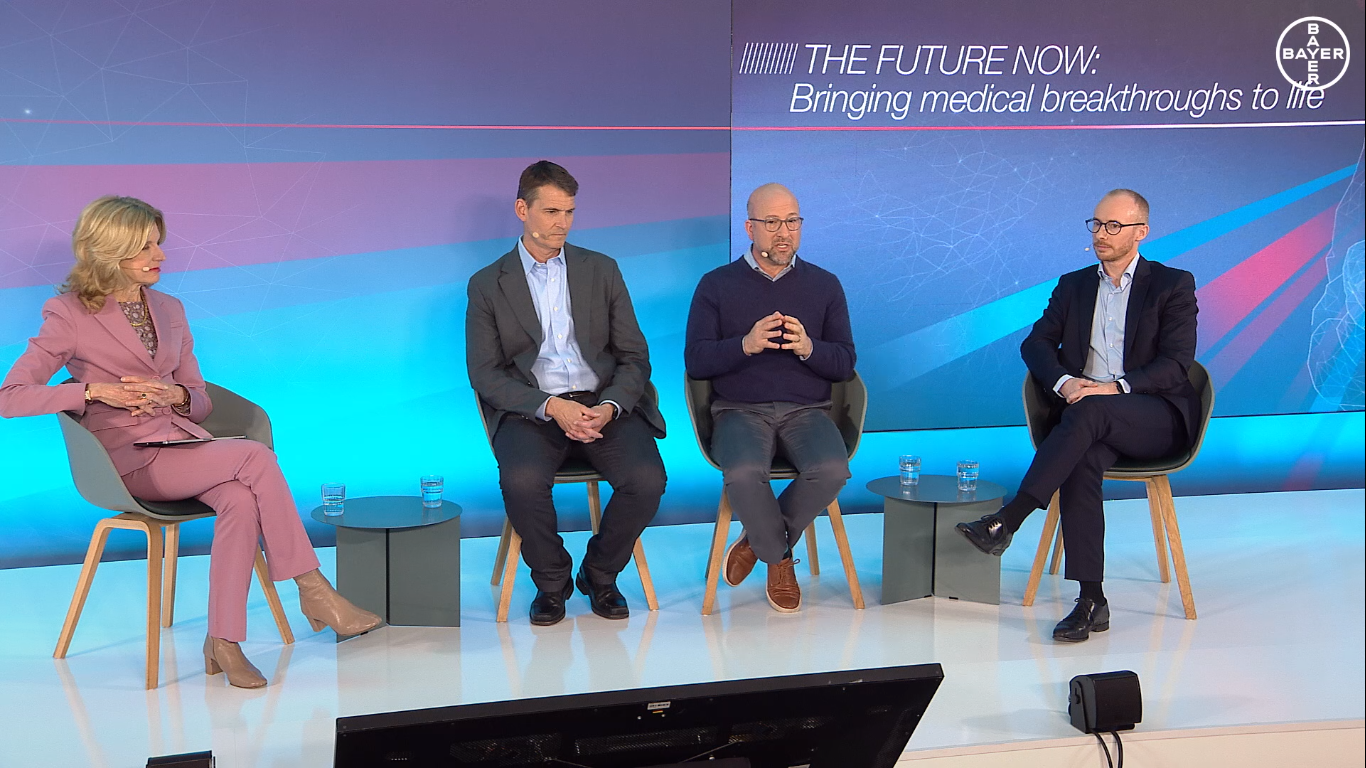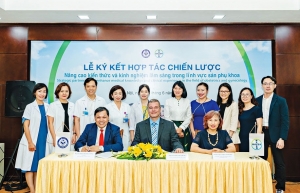Bayer unveils medical breakthroughs
 |
Bayer has strengthened its innovation engine with a clear research focus on core therapeutic areas: cardiovascular diseases, oncology, immunology, neurology, and rare diseases.
At its annual Pharma Media Day on March 21, Bayer showcased the latest advancements in the transformation of its pharma business to fuel long-term, sustainable growth.
"We have made significant progress in growing our pipeline value, clearly demonstrating that our revised research and development (R&D) strategy is bearing fruit," said Stefan Oelrich, member of the Board of Management at Bayer AG and president of Bayer’s Pharmaceuticals Division. "At the same time, we are further expanding our presence in key therapeutic areas, making important progress, and ensuring we can deliver our medicines to as many patients as possible."
Among them, women's health remains a key focus area for Bayer. By advancing a portfolio of innovative treatments, Bayer is investing in broadening therapeutic options and raising the standard of care for menopausal women.
Although hormone therapy is the gold standard of treatment, it cannot be used by many women for medical reasons or personal preferences. There is still a big unmet need for bringing innovation into menopause.
Bayer estimates that the global population of menopausal women will increase to 1.2 billion by 2030, with 47 million new women entering this phase each year. However, around 30 per cent of women who consult a healthcare professional with moderate-to-severe symptoms are not prescribed any treatment.
According to Cecilia Caetano, head of Global Medical Affairs for Women’s Health at Bayer AG., Bayer has been bringing innovation to women's health for decades.
"Many women worldwide are suffering from vasomotor symptoms during their menopausal transition, which, along with sleep disturbance, are common symptoms that can strongly impact their quality of life," said Caetano.
"We are committed to advancing the science by driving education, raising awareness, and broadening treatment choices to support women across all stages of their lives."
Besides women's health, Bayer also pays special attention to oncology as part of its pharma strategy. Bayer is making important progress on its journey towards becoming a top oncology company.
"We have ramped up our precision oncology development capabilities to unlock the next generation of breakthrough therapies and build a strong, sustainable pipeline across the areas of tumour intrinsic pathways, immune-oncology, and targeted radiotherapies," said Dominik Ruettinger, head of Research and Early Development for Oncology at Bayer AG. "To address unmet medical needs in cancer care, we are pushing the boundaries of innovation to provide patients with impactful medicines fitted to their personal needs."
"We are tapping several sources for new programmes that will enhance our portfolio. One is built on academic alliances and collaboration, while another is our platform companies, like biopharmaceutical company Vividion Therapeutics. The third significant source is our business development activities in partnered innovation. There is also in-house research that helps us develop new programmes. In summary, we are building a truly world-class oncology R&D portfolio out of these four sources," Ruettinger added.
Among Bayer's portfolio, oncology is being given the top priority as the number of cancer patients is set to rise. Studies indicate that cancer patients are becoming younger at first diagnosis, and more patients are being diagnosed at an earlier stage of the disease. These patients require both efficacious and compassionate treatment, including therapies that are designed to overcome drug resistance.
With the acquisition of Vividion and its industry-leading chemoproteomics platform, Bayer has strengthened its pharmaceutical research and pipeline in small-molecule and precision therapeutics. Vividion’s innovative technology allows the identification of previously unknown binding pockets in 'undruggable targets'.
 |
Another medical breakthrough lies in Bayer's cell therapies and gene therapies. The company's consistent investment in the area, from early research to manufacturing capacities and platforms, emphasises its significance as a key future growth driver for the company.
Together with its subsidiaries, BlueRock and AskBio, Bayer is advancing a competitive, preclinical and clinical, cell and gene therapy portfolio.
"Since 2020, Bayer has invested more than $3.8 million in technology platforms to discover and develop cell and gene therapies–two of the fastest-growing and most competitive fields in modern healthcare," said Christian Rommel, member of the Executive Committee of Bayer’s Pharmaceuticals Division and head of Research and Development.
“We are excited about the critical progress we are making with our diverse and state-of-the-art therapeutic modality platforms. While these programmes are still at an early stage, we are confident that they will bring meaningful benefits for patients in the future,” Rommel added.
This year marks Bayer's 30th anniversary in Vietnam, in which time the company has made a strong commitment to improving the quality of community healthcare and delivering patient-centric care. Over the past three decades, Bayer Vietnam has provided innovative and effective healthcare solutions and collaborated with partners to implement many initiatives that have raised awareness in key areas such as cardiovascular diseases, oncology, and women's health.
 | Bayer Vietnam in advance to health for all Bayer Vietnam is maintaining its position at the forefront of innovative solutions and partnerships to promote the sustainable development of the nation’s healthcare sector. |
 | Bayer launches Science for Her campaign to raise awareness of women's healthcare Bayer has kicked off the Science for Her campaign in Vietnam to improve awareness and boost knowledge about women's healthcare. |
 | Bayer leveraging digital models to enhance healthcare The percentage of the world’s population over age 60 is predicted to reach almost 22 per cent by 2050 – almost double the percentage reported in 2015. The impact of the demographic shift to an ageing and growing population is being felt across society and industries. |
What the stars mean:
★ Poor ★ ★ Promising ★★★ Good ★★★★ Very good ★★★★★ Exceptional
 Tag:
Tag:
Related Contents
Latest News
More News
- Agentic AI set to reshape Vietnam’s enterprise landscape (February 10, 2026 | 12:06)
- Agro-forestry and fisheries exports jump nearly 30 per cent in January (February 09, 2026 | 17:45)
- Canada trade minister to visit Vietnam and Singapore (February 09, 2026 | 17:37)
- New tax incentives to benefit startups and SMEs (February 09, 2026 | 17:27)
- Vietnam forest protection initiative launched (February 07, 2026 | 09:00)
- China buys $1.5bn of Vietnam farm produce in early 2026 (February 06, 2026 | 20:00)
- Vietnam-South Africa strategic partnership boosts business links (February 06, 2026 | 13:28)
- Mondelez Kinh Do renews the spirit of togetherness (February 06, 2026 | 09:35)
- Seafood exports rise in January (February 05, 2026 | 17:31)
- Accelerating digitalisation of air traffic services in Vietnam (February 05, 2026 | 17:30)






















 Mobile Version
Mobile Version